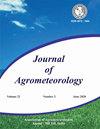Estimation of actual evapotranspiration using the simplified-surface energy balance index model on an irrigated agricultural farm
Q3 Agricultural and Biological Sciences
引用次数: 0
Abstract
Evapotranspiration (ET) plays a crucial role in the energy and water balance of agricultural ecosystems and is a vital component of the hydrological cycle. Efficient irrigation water management relies on accurate spatiotemporal coverage of crop ET across a farm. Thanks to the availability of multi-temporal high-resolution satellite datasets and remote sensing-based surface energy balance models, near-real-time estimation of ET is now possible. This study utilized Landsat 8/9 data to estimate ET using the simplified surface energy balance index (S-SEBI) model, which was then compared to eddy covariance measurements over a semi-arid agricultural farm in New Delhi, India during the post-monsoon periods of 2021-22 and 2022-23. The S-SEBI model predicted daily ET from Landsat 8/9 data with an average correlation coefficient and RMSE of 0.89 and 0.79 mm/day, respectively. The spatiotemporal map was also used to evaluate the model's performance, and it could accurately differentiate between ET over dryland crops and well-irrigated wheat fields on the farm. Despite underestimating ET (0.51 mm/day) during the initial growing season (Nov-Dec) and overestimating it (0.73 mm/day) during mid-season (Feb-Mar), the S-SEBI model can still be an operational tool for mapping ET with high accuracy and sufficient variation across pixels, making it an ideal option for incorporating into irrigation scheduling.基于简化地表能量平衡指数模型的灌溉农田实际蒸散量估算
蒸发蒸腾量在农业生态系统的能量和水分平衡中起着至关重要的作用,是水文循环的重要组成部分。高效的灌溉水管理依赖于农场作物ET的准确时空覆盖。由于有了多时相高分辨率卫星数据集和基于遥感的地表能量平衡模型,现在可以对ET进行近实时估计。本研究利用陆地卫星8/9数据,使用简化的地表能量平衡指数(S-SEBI)模型估计ET,然后将其与2021-22年和2022-23年后季风时期印度新德里半干旱农业农场的涡度协方差测量值进行比较。S-SEBI模型根据Landsat 8/9数据预测了每日ET,平均相关系数和RMSE分别为0.89和0.79 mm/天。时空图也被用于评估该模型的性能,它可以准确区分旱地作物和农田灌溉良好的麦田上的ET。尽管在最初的生长季节(11月至12月)低估了ET(0.51毫米/天),在季中(2月至3月)高估了ET(0.73毫米/天。
本文章由计算机程序翻译,如有差异,请以英文原文为准。
求助全文
约1分钟内获得全文
求助全文
来源期刊

Journal of Agrometeorology
农林科学-农艺学
CiteScore
1.40
自引率
0.00%
发文量
95
审稿时长
>12 weeks
期刊介绍:
The Journal of Agrometeorology (ISSN 0972-1665) , is a quarterly publication of Association of Agrometeorologists appearing in March, June, September and December. Since its beginning in 1999 till 2016, it was a half yearly publication appearing in June and December. In addition to regular issues, Association also brings out the special issues of the journal covering selected papers presented in seminar symposia organized by the Association.
 求助内容:
求助内容: 应助结果提醒方式:
应助结果提醒方式:


